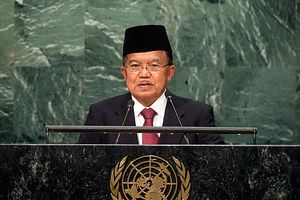Last week, Indonesia officially announced its public bid for a United Nations Security Council (UNSC) seat.
In a speech before the United Nations General Assembly on Friday, the country’s vice president, Jusuf Kalla, said that he was announcing Indonesia’s bid to be a non-permanent member of the UNSC from 2019 to 2020.
“Against this backdrop, allow me in this august opportunity to announce Indonesia’s candidature to the non-permanent membership of the UN Security Council for the period 2019-2020,” Kalla said in prepared remarks.
Kalla’s speech was part of a broader Indonesian campaign that ran through the later part of last week. The official start of the campaign was marked by the sounding of a gong by Kalla during an event which involved a reception as well as Indonesian cultural performances.
Though Kalla’s speech began by addressing the subject of achieving sustainable development goals by 2030, which was the theme of the session he was speaking at, he then moved to set up the pitch for Indonesia’s candidature, arguing that Jakarta’s commitment and contributions to the UN made it a “true partner for world peace.”
Peace is a prerequisite to development, Kalla argued, and Indonesia had learned that first hand with a period in the 1950s and 1960s where it saw internal conflict and regional strife and a focus away from development. Yet many parts of the world today continue to see what he termed a “peace deficit,” with rising tensions, unresolved territorial disputes, constant threats from terrorism, extremism and radicalism, and a long list of non-traditional challenges.
These challenges require a global partnership, Kalla said, along with a more representative, democratic, and effective UNSC. As the world’s fourth most populous nation, third largest democracy, and largest Muslim-majority country, he said Indonesia was prepared to play a role.
His pitch for a UNSC seat also stressed Indonesia’s commitment to multilateralism and leadership in several areas, including climate change, maritime affairs, counterterrorism, peacekeeping, and human rights.
“Indonesia is a true advocate of multilateralism,” Kalla said. “It is inherent in our DNA…in the founding of our nation…in our constitution.”
Apart from Kalla, Indonesian Foreign Minister Retno Marsudi also voiced her support for Jakarta’s bid, saying in a statement that Indonesia had the “required qualifications” for the UNSC seat and that the country was ready for it. Indonesian President Joko “Jokowi” Widodo, meanwhile, did not attend the UN proceedings for the second year in a row.
Among Southeast Asian nations, Malaysia is the latest to hold a non-permanent seat in the UNSC for the 2015-2016 period. Thailand had lost its bid this year to Kazakhstan.
Indonesia has been previously elected as a non-permanent UNSC member three times. In its bid for a fourth term representing Asia, it will likely face off against other candidates, including India.

































